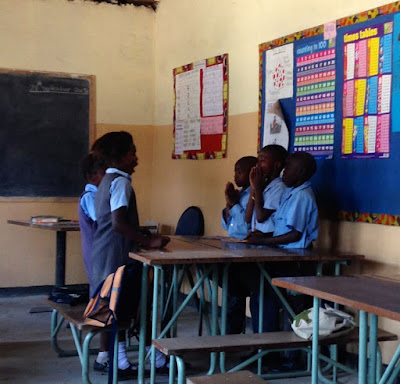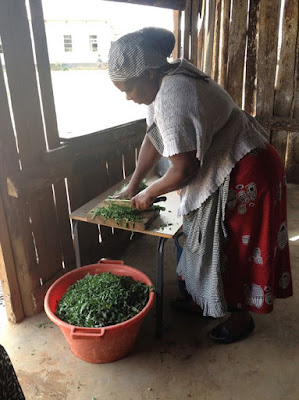Six months ago that Mike and I left Heathrow to start our
new adventure; volunteering with Beyond
Ourselves. It has been an amazing journey, with so much to learn and experience,
amazing opportunities but also some challenges, both personally and for the
people of Zambia.
Just to set the scene, I was a Head Teacher in Tower Hamlets
in London and my husband Mike was running his own construction business. We had
decided about a year ago that it was time for us to do something different with
our lives. So this time last year, I said my farewells to my school and started
the process of packing up our house. We had visited Ndola and the amazing team,
who are Beyond Ourselves Zambia, in
February before deciding that we would very much like to join them. As we had just taken early retirement, we knew
that we wanted to spend some of our time working with the charity and some time
exploring and learning more about life in Zambia and the neighbouring countries.
We arrived in June, and were lucky enough to stay with
Emily, Malcolm, Lucy and Albert while we settled in and found ourselves
somewhere to live. We eventually found a house to rent on a farm, just outside
Ndola, which really suits us as we both enjoy the wildlife and the peace and
quiet. We have seen so much wildlife in such a short time. Sitting in the
garden in the evening watching the resident family of owls teaching the young
one how to hunt and the amazing coloured birds flying around will be memories
we will treasure.

In the first few weeks we started to accompany Emily into
the schools. She was very patient about answering our numerous questions and
giving us a crash course in Zambian education.
As you can imagine, the schools are built and organised very differently
from those in England. Mike has been learning lots about building practises in
Zambia, and seems to have spent a lot of time looking at the ablutions! For
those of you with a background in education, you will know how much time we all
spend talking about toilets so it came as no surprise to us. I have been busy trying to learn more about
the Zambian education system and the expectations in the schools, which has
been fascinating.
So far a large percentage of our time has been at Kawama
School where Mike has ensured that water is available and that the school now
has a modern toilet block for the children and of course staff, to use. This
has involved getting a new water supply via a borehole and pumping it to a tank
high on a stand. We all know that it is not always easy working with
contractors anywhere in the world, but it has been frustrating at times. Working
practices in Africa are, well, very African. People don’t always turn up on
time or even turn up at all. Often when they do arrive they have no equipment
so have to go again. Since he has been at Kawama, Mike has been working to
involve local people from the immediate community with the idea of developing
their skills . Having found hard working individuals, who are keen to develop
and learn new skills, is very rewarding has made a huge difference. Hopefully, once
the local community are involved in working there, they will begin to have more
pride in the school and it’s facilities.
One of my highlights this term was seeing the teachers begin
to understand the importance of play for young children, which is something I
am passionate about but is not yet fully accepted in Zambia. I have also been
working with the Head Teacher to share some of the Leadership skills that I
have developed over the years. It has made me realise just how lucky we are in
England to have good quality training as part of our jobs.
We love living in Ndola, which prides itself on being the
‘Friendly City’. It really does live up to it’s name as people are so welcoming
wherever we go. Compared to cities in
England, it’s not large, but we found that we have very quickly got used to being
here. Still there have been some
challenges for us, being very used to living in London, shopping is very
different. The supermarkets are mostly South African, such as Pick and Pay and
Shoprite which sell most things that we would want. However, you can never rely
on them having what you want when you want it. We have learned to buy things
when they are on the shelves and enjoy them. We have also been exploring the
smaller, more local shops which makes shopping more interesting. As a
vegetarian who has lived in London for many years, I am very grateful that
there are numerous Indian restaurants and Pizza places.

Many of you will be aware of the challenges that Zambia faces
at the moment, most significantly the crash in the value of the kwatcha against
the dollar and the loadshedding. Since we have been here, the value of the
kwacha has fallen by over 50%. This has meant that the prices have risen
dramatically. We have noticed just how quickly prices have gone up, even for
goods produced in Zambia. Talking to people in the community makes us realise
just how hard it has become just to feed their families and pay their rent. Loadshedding
means that there are times each day when there is no electricity, at the moment
anywhere between 8-9 hours. People running businesses now have the added burden
of trying to organise their day around the times when they have power. It is
hard to see people trying to make a living and improve their lives when life is
so difficult for them. Although there is never enough that we can do, we hope
that by giving the children in the schools a good start to their lives with the
feeding programme and the quality of education they receive, the future will
hopefully be a little brighter for them.
Own personal challenges have involved attempting to import a
car that we bought in South Africa in August. All I can say is that we have
learned a lot about the systems in place in Zambia which are very different
from what we are used to. When we spoke to people before we bought the car, it sounded
fairly simple. However, we have now learned that everything takes much longer
than we were expecting, and has involved numerous meetings and even a trip to
Lusaka. Frustrating though it has been, it has given us an insight into some of
the difficulties that countries face in developing their economy.
Much as we love being in Ndola, we have also taken the
opportunity of travelling in Zambia and neighbouring countries. Back in July
and August we flew to South Africa, where we picked up our now infamous car and
drove back, over six weeks, to Ndola via Botswana, Namibia and criss-crossing
Zambia through many of the National Parks.
Zambia is not yet as well developed for tourists as other
countries, but with a bit of effort and patience there are amazing things to
see and do. Recently we went to Kasanka,
one of the smaller National Parks, to witness the World’s largest mammal
migration. No not the large mammals of the Serengeti but the 10 million or so
Straw Coloured Fruit Bats that roost there every November.
All in all Zambia is a fantastic place and for us working
here with Beyond Ourselves is an amazing time and one we love.




















































